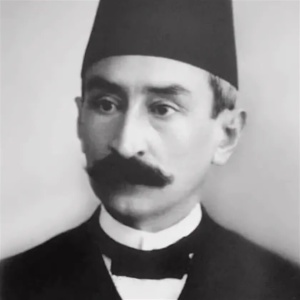
Fatih Karimi was a writer, publisher, and activist.
He was born in March 30, 1870 in Minnibaevo village, Bugulma district, Samara province, in the family of an imam and madrasah teacher Gilman Karimov (1841–1902). His primary education was at home. He studied at Madrasah Kamaliya (Chistopol town) till 1892, while also attending classes in Russian language and literature, for which he was expelled (along with promoting the ideas of the Tardzheman newspaper among shakirds). In 1892-1896, he attended Mekteb Mulkiya-Shakhane, an Istanbul higher school for the training of officials. He was fluent in Arabic, Persian, Turkish, and French. In 1896-1898, he taught at the Derekoy village madrasah in the Yalta district of Taurida province.
Fatih Karimi traveled to Europe with gold miner M. Ramiev from February to May 1899; the same year, he studied typography and German in Moscow. Karimi moved to Orenburg with his family in July 1899 and taught at summer courses for the training of teachers of new method schools in Kargaly Sloboda. In 1900, he interned at Boragansky’s printing house in St. Petersburg. Fatih Karimi has led the printing house “Karimov, Khusainov and Co.” since 1902, following the death of his father. He founded a Muslim literary circle in 1906 and has served on the Central Committee of the Ittifaq al-Muslimin party since then. He was the editor-in-chief of the Waqyt newspaper from 1906 to 1917, and he was the chairman of the Bureau of Orenburg Muslims in 1917.
Karimi was elected a delegate to the All-Russian Congresses of Muslims (1905, 1906, 1914 and 1917). He was elected to the All-Russian Muslim Council (Milli Shura) from the city of Orenburg in May 1917, at the First All-Russian Muslim Congress. In November 1, 1917, he launched the Yanga Waqyt newspaper. He taught at various educational institutions in Orenburg from 1917 to 1924. Karimi has been a member of the editorial boards of the newspapers “Eshchelar Donyasy” and “Yul” since 1919.
Karimi moved to Moscow in 1925, where he worked at the Tatar branch of the Central Publishing House of the Peoples of the Soviet Union, taught Turkish at the Oriental Institute, and collaborated with the Eshche newspaper. Karimi wrote over 100 methodological, pedagogical, journalistic and artistic books, including “Nuretdin Khalfa”, “Zhihangir Madum” (Son of Mulla Jihangir), “Morza Kyzy Fatima” (Daughter of Murza Fatima), “Ber Shakert Ilya Ber Studient” (A Shakird and a Student), “Kyrymga Sayahat” (Journey to the Crimea), etc. Karimi was arrested in August 1937 and charged with “espionage for Turkey and preparation of terrorist acts against party leaders” and sentenced to death. He was rehabilitated in 1959.
